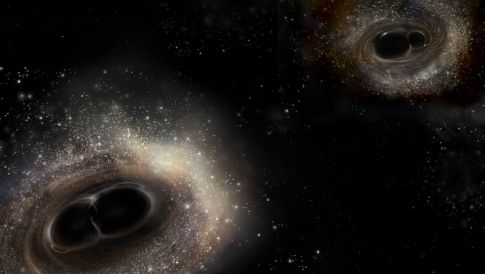
LIGO/A. Simmonet
The latest edition of the podcast is now up. (For those expecting our regular December countdown of the year's top physics stories with Ian Durham, do not fear: I will be posting that too, later this month.)
I recorded a couple of the interviews featured in this edition back at FQXi's meeting in Banff, back in August. As well as the main talks (videos of which are constantly being added to our Youtube channel), we also have a "lightning round," in which participants have a few minutes to talk about their latest research. Two of those, in particular, caught my attention, so I asked the speakers to explain a bit more for the podcast.
December 12, 2016
Retrocausal reality with Ken Wharton; tips for FQXi's new essay contest; the Breakthrough prizes in physics; the science of terrorism, with Peter Byrne; & Carlo Rovelli gives a brief lesson on writing a physics bestseller.
Full Podcast
First up is physicist
Ken Wharton, of San Jose State University, who talks about retrocausality--the idea that at the microlevel, events in the future can influence the past. This time-twisting view of reality might help solve some quantum paradoxes, if we're willing to give up our everyday notions of cause and effect. Listen to Wharton to find out more about why some physicists are taking this so seriously. You can also read more about the topic in this
profile of quantum physicist Matt Leifer, who is also delving into retrocausality, by Kate Becker.
If that wasn't provocative enough, journalist Peter Byrne's lightning talk was called "The Science of ISIS"--which certainly made the audience sit up and take notice. In his podcast interview, he explains why this topic, which he is researching for a new book, fitted well with one of the themes of the conference, "the Physics of the Observer."
We should also congratulate Byrne because he recently won a gold award in the Kavli Science Journalism awards.
Two other FQXi members, string theorists Joe Polchinski and Andrew Strominger, along with Cumrun Vafa, were honoured in recent weeks, sharing the $3 million Breakthrough prize for Fundamental Physics. Polchinski was nominated in part for his work on the firewall paradox; with colleagues, he realised that if quantum theory is correct, then black holes are surrounded by a firewall, a ring of high energy particles (contradicting general relativity), or there is no firewall, but quantum theory is wrong. The LIGO collaboration also won a special Breakthrough prize for their discovery of gravitational waves generated by the merger of two black holes, earlier this year.
In the news round-up, Brendan and I chat about the Breakthrough winners--as well as a new piece of research that brings both Breakthrough physics awards together: Cosmologist Niayesh Afshordi recently carried out an analysis looking for echoes of the gravitational wave signals, which would signal the breakdown of general relativity at the black hole's edge, its event horizon, which could even, he says, be signs of a firewall, or other exotic physics. As I wrote in a news article about the work for Nature, Afshordi's team has found tentative signs of such echoes--potentially the first signs of general relativity unravelling. You can read more about that in my story, "LIGO Black Hole Echoes Hint at General-Relativity Breakdown."
Plus Brendan offers more information and tips for this year's $40,000 essay contest, "Wandering Towards a Goal."
And finally, Carlo Rovelli chats to reporter Colin Stuart about how to write an international bestseller, like his phenomenally successful "Seven Brief Lessons on Physics." You can also read Colin's profile of Rovelli, and his work looking for observational signs of loop quantum gravity, in the form of black holes turning into white holes, in the article, "The Spacetime Revolutionary."
Enjoy!